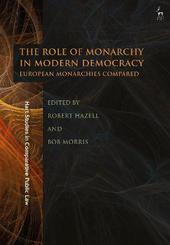
|
The Role of Monarchy in Modern Democracy: European Monarchies Compared
Paperback / softback
Main Details
| Title |
The Role of Monarchy in Modern Democracy: European Monarchies Compared
|
| Authors and Contributors |
Edited by Robert Hazell
|
|
Edited by Bob Morris
|
| Series | Hart Studies in Comparative Public Law |
|---|
| Physical Properties |
| Format:Paperback / softback | | Pages:328 | | Dimensions(mm): Height 244,Width 169 |
|
| ISBN/Barcode |
9781509944552
|
| Classifications | Dewey:342.4062 |
|---|
| Audience | | Tertiary Education (US: College) | |
|---|
|
Publishing Details |
| Publisher |
Bloomsbury Publishing PLC
|
| Imprint |
Hart Publishing
|
| Publication Date |
17 March 2022 |
| Publication Country |
United Kingdom
|
Description
How much power does a monarch really have? How much autonomy do they enjoy? Who regulates the size of the royal family, their finances, the rules of succession? These are some of the questions considered in this edited collection on the monarchies of Europe. The book is written by experts from Belgium, Denmark, Luxembourg, the Netherlands, Norway, Spain, Sweden and the UK. It considers the constitutional and political role of monarchy, its powers and functions, how it is defined and regulated, the laws of succession and royal finances, relations with the media, the popularity of the monarchy and why it endures. No new political theory on this topic has been developed since Bagehot wrote about the monarchy in The English Constitution (1867). The same is true of the other European monarchies. 150 years on, with their formal powers greatly reduced, how has this ancient, hereditary institution managed to survive and what is a modern monarch's role? What theory can be derived about the role of monarchy in advanced democracies, and what lessons can the different European monarchies learn from each other? The public look to the monarchy to represent continuity, stability and tradition, but also want it to be modern, to reflect modern values and be a focus for national identity. The whole institution is shot through with contradictions, myths and misunderstandings. This book should lead to a more realistic debate about our expectations of the monarchy, its role and its future. The contributors are leading experts from all over Europe: Rudy Andeweg, Ian Bradley, Paul Bovend'Eert, Axel Calissendorff, Frank Cranmer, Robert Hazell, Olivia Hepsworth, Luc Heuschling, Helle Krunke, Bob Morris, Roger Mortimore, Lennart Nilsson, Philip Murphy, Quentin Pironnet, Bart van Poelgeest, Frank Prochaska, Charles Powell, Jean Seaton, Eivind Smith.
Author Biography
Robert Hazell was the founder and first Director and Bob Morris is an honorary Senior Research Associate, both at the Constitution Unit, University College London.
ReviewsThis volume is extremely useful at providing an empirical base for further work, full of data on everything from referenda on retaining the monarchy to the per capita costs of the royal families ... the book also invites further inquiry, both in extending the study beyond Europe as well as in delving into a deeper social scientific account of the variation this study has exposed. -- Tom Ginsburg, University of Chicago * International Journal of Constitutional Law * A scholarly yet enjoyable read. The commentary is thought-provoking and insightful with much for the reader to mull over ... I recommend this book for all academic law libraries, academic libraries serving historians and political scientists, and government libraries with constitutional law collections. -- Sandra Geddes, Bennett Jones * Canadian Law Library Review * A meticulously researched volume that furthers our understanding of monarchy in advanced democracies ... This volume is welcome for raising important questions concerning the feasibility of maintaining an institution which is often labelled backward and out of place in the modern world. -- Aidan Jones, King's College London * Royal Studies Journal * An essential resource for anyone interested in monarchy and, perhaps more importantly, the collection effectively demonstrates why it matters now and why, for constitutional lawyers in particular, it is likely to matter more in the future. But the collection as a whole also presents an invitation to critical and socio-legal legal scholars interested in nationalism, celebrity, the media and the family, to name just a few issues, to consider looking more closely at the monarchy. Finally, Hazell and Morris' conclusions ought to be required reading for any monarch intent on keeping his or her throne. -- Daniel Monk, Birkbeck, University of London * International Journal of Law in Context * This comparative work on eight monarchies is a valuable addition to the literature, providing a wealth of data to support further writing and research. -- Robert Blackburn, King's College London * Public Law *
|